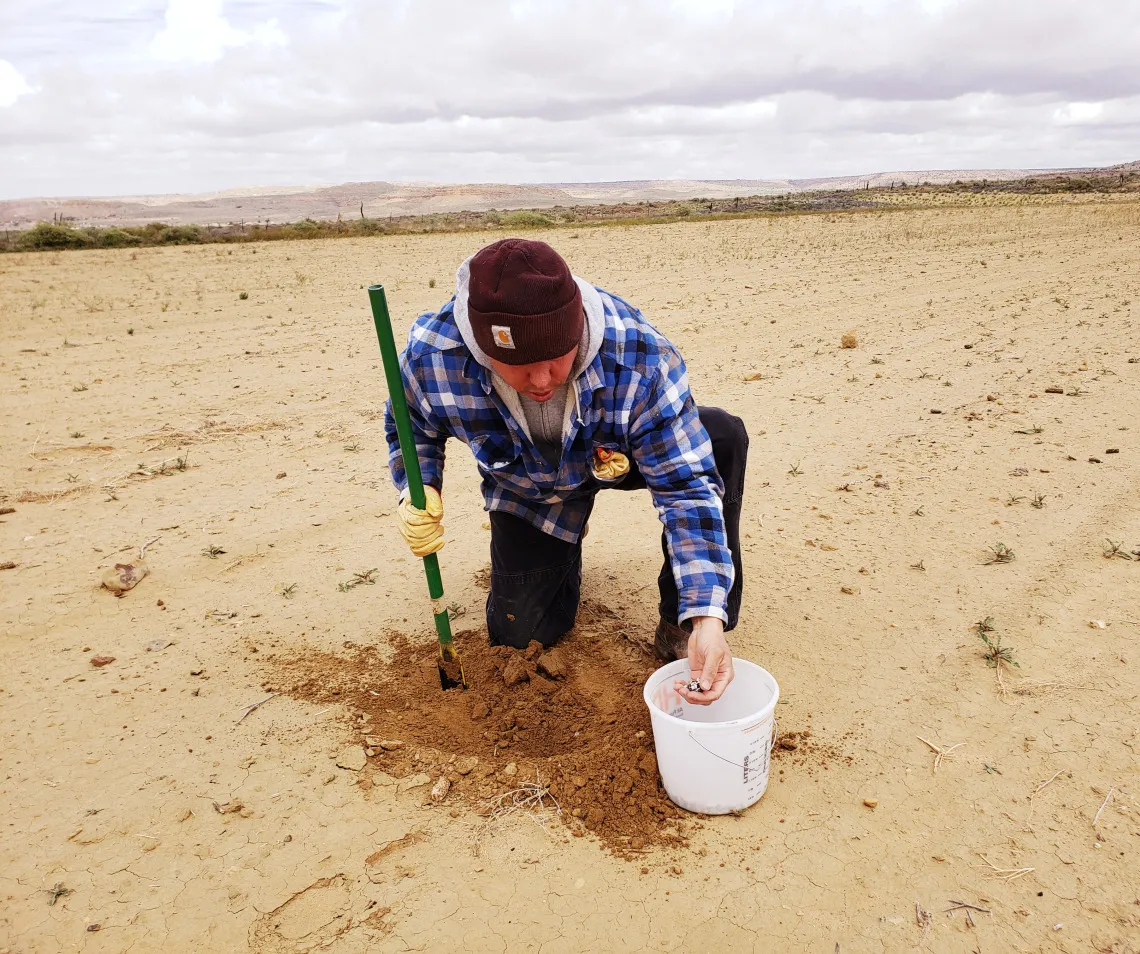Revitalizing Indigenous Foodways: A Grant for Sustainable Growth
A new project fueled by a nearly $500,000 grant from The Rockefeller Foundation’s Climate Exploration Fund aims to breathe new life into Tribal communities' food systems and bring recognition for Indigenous agricultural contributions.

Michael Kotutwa Johnson works with Indigenous communities in the Southwest to revitalize varieties of seeds grown by Indigenous farmers that are adapted to survive in harsh climates.
For centuries, Indigenous people in the American Southwest developed and refined agricultural practices to grow crops on less than 10 inches of annual rain, cultivating seeds that can thrive in Arizona’s unique environment.
“To the Hopi people, the seeds they have nurtured are part of their heritage,” said Michael Kotutwa Johnson, a traditional Hopi farmer and assistant specialist for Indigenous Resilience with the University of Arizona Cooperative Extension. “These seeds represent life to us, but they’re scattered and disconnected from where they were originally grown.”
Through a new community-led project, Kotutwa Johnson hopes to restore lost varieties of seeds essential to the resilience of Indigenous communities in the face of increasingly scarce water resources, as well as advance the understanding and practice of traditional dryland farming.
“We need to increase the biodiversity that we once had in our cropping system to become more sustainable,” he said, “and when I talk about sustainability, it’s not just from a health standpoint, which is part of this study too, but also one of resilience and bringing recognition that we are scientists in our own right.”
Kotutwa Johnson envisions the project as a transformative effort, actively engaging with Tribal communities to address their challenges with data sovereignty. Alongside his colleagues, Stephanie Russo Carroll, associate research professor at the Native Nations Institute, and Matthew Rowe, assistant professor at the School of Anthropology, Kotutwa Johnson will take a community-focused approach, prioritizing the revitalization of Pueblo seed biodiversity and sustainability.
"Revitalizing native foodways, preserving and expanding the cultivation of nutrient-dense Indigenous seeds, and upholding Indigenous data sovereignty – or how digital data is generated, processed, and stored – are essential pillars in the fight against the climate crisis,” said Alexandra Payne, Senior Associate at The Rockefeller Foundation.
“These efforts not only foster ecological resilience but also empower Tribal communities, who are both on the frontlines of the climate crisis and hold the knowledge for a better path forward, to safeguard their heritage and promote regenerative practices that can help build a more resilient future."
An initiative for tribal heritage and data sovereignty
One important challenge encountered by Tribal communities is the diminishing biodiversity within their cropping systems. This project seeks to address this challenge by cultivating Indigenous seeds. A key objective is to grow at least two or three varieties of Indigenous seeds and reintroduce them into the community, with a particular focus on the younger generation.
“One of the main things that I see in Tribal communities, when it comes to revitalizing anything, is that they lack supplies, especially things like seeds,” Kotutwa Johnson said. “We at one time had 17 different varieties of Hopi corn seeds. Now we only grow two or three of those. To me, it's important that we engage with the youth, and that they have incentives to plant more. Without those supplies of seeds, we cannot do that.”
Kotutwa Johnson's vision goes beyond cultivation. A key aspect of the initiative involves addressing data sovereignty and self-determination. The project acknowledges the importance of safeguarding the data generated from this study and ensuring it remains in the hands of the community, which he hopes will be the first step towards protecting Indigenous intellectual property.
“It'll be good to bring a Tribal agricultural network in so that we can also not only talk about revitalization, but come up with and try to adopt an agricultural code. This way, we can protect our rights and intellectual property” he said.
Breaking free from museum walls
As the project progresses, Kotutwa Johnson stresses the importance of recognition and community-building, moving beyond a narrative of victimhood and working to elevate Indigenous resilience instead. His approach involves actively engaging with tribes, sharing information, and acknowledging the unique challenges faced by Indigenous communities.
“To me, it's a demonstration of Indigenous resiliency,” he said. “You know, it's a project that shows how things were done, how things are still being currently administered, and how we're creating our own sense of resilience, despite all of the barriers that we have confronted.”
He also advocates for a move away from historical representation of Indigenous people, emphasizing the need to bring Indigenous narratives back into everyday life. This underscores Kotutwa Johnson’s goal of bringing back an Indigenous sustainable agricultural system that has withstood the test of time.
“You know, I am tired of going to the museum and seeing Indigenous people in black and white pictures with feathers and long hair and all that stuff,” Kotutwa Johnson said. “We need to get off the wall. We need to get back into your living room. It's about building a community through a system that has been sustainable for all these years.”

